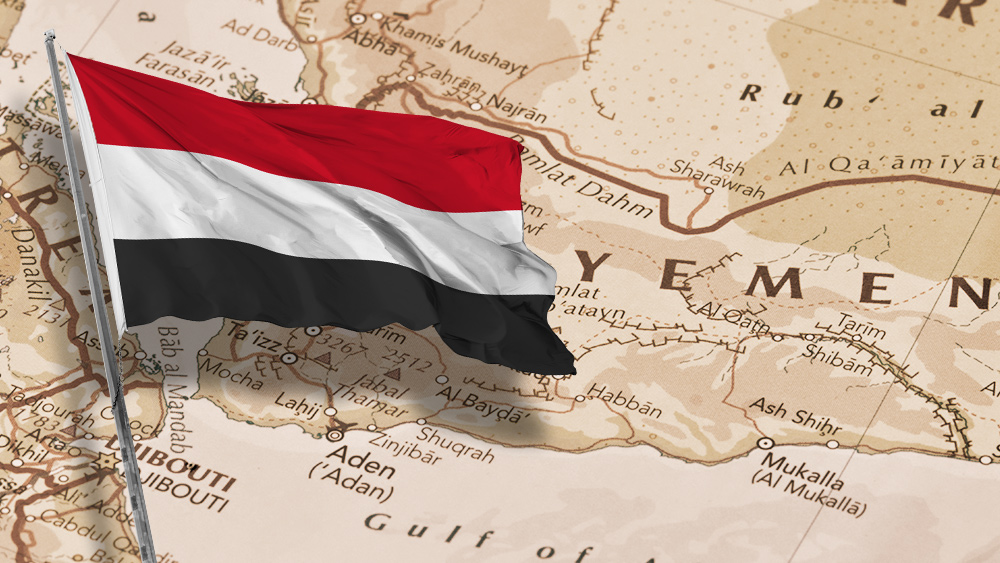 Parler
Parler Gab
Gab
- U.S. airstrikes in Yemen’s Al-Hodeidah Governorate destroyed the Al-Senif water reservoir, cutting off clean water for over 50,000 civilians and worsening the humanitarian crisis.
- The bombing campaign intensified after Yemen’s Houthi-led government reimposed a maritime ban on Israeli-linked vessels in the Red Sea, part of their protest against Israel’s actions in Gaza.
- Previous cuts to U.S. humanitarian aid (under Trump) and legal hurdles for aid groups (due to Houthi terrorism designation) have crippled relief efforts, with organizations downsizing or leaving.
- At least 61 civilians have been killed and 139 injured since March 15, with human rights groups accusing the U.S. of war crimes for targeting vital civilian infrastructure.
- The U.N. and rights organizations demand an end to hostilities, warning of catastrophic health and humanitarian consequences if aid collapses and bombings continue.
The humanitarian crisis deepens
The recent wave of U.S. airstrikes, targeting critical infrastructure in Yemen, has exacerbated an already dire humanitarian situation. The bombing of the Al-Senif water reservoir in Mansouriya district has left more than 50,000 civilians without access to water, a fundamental resource in a country where frequent water shortages have long plagued millions. This development has raised serious concerns among aid organizations already struggling to maintain operations due to previous cuts in U.S. humanitarian aid. Siddiq Khan, country director for Islamic Relief in Yemen, expressed his alarm at the escalating crisis. "Now the rampant bombing has started, you never know which way things will go," Khan said. He attributed the current crisis to both the Trump-era policy of massive USAID cuts and the legal hurdles faced by aid groups following the designation of Ansarallah, Yemen’s governing resistance movement, as a “foreign terrorist organization.” The impact of these cuts has been profound, with many organizations downsizing and some even closing operations. "Overall, there has been a gradual but then sharp kind of decline in humanitarian aid to Yemen," Khan explained. "I see a real catastrophe coming Yemen's way." The U.S. military has been carrying out daily bombing campaigns since March 15, following Yemen’s re-imposition of a maritime ban on Israeli-linked vessels. The escalation began in response to the Houthi-controlled government’s decision to resume attacks on Israeli-linked ships and targets in the Red and Arabian Seas. These attacks, which began in November 2023, mirrored Yemen’s staunch support for Palestinians in Gaza, where Israel’s campaign has resulted in over 50,000 fatalities and displaced nearly two million people.The role of the U.S. military and international repercussions
The U.S. claims that its military operation in Yemen is aimed at protecting its interests and ensuring the freedom of navigation, particularly in the critical Bab el-Mandeb Strait, a narrow waterway connecting the Red Sea to the Gulf of Aden. However, these strategic interests come at a significant cost for Yemeni civilians, many of whom are already suffering from years of conflict, poverty and disease. The targeted destruction of a water reservoir, which could have catastrophic health implications, particularly for vulnerable populations like children and the elderly, underscores the humanitarian dimension of the campaign. "These bombings have further scared the organizations here about whether this will be the right place to stay and work," Khan emphasized. The vacuum left by the withdrawal of aid organizations could have severe consequences for the already fragile and overstressed humanitarian sector. According to Yemen’s Health Ministry, at least 61 civilians have been killed and 139 injured in U.S. airstrikes since March 15, further highlighting the disproportionate impact on non-combatants. The international community has reacted with concern and condemnation. Human rights organizations have accused the U.S. of committing war crimes by targeting civilian objects and water facilities, while the United Nations has called for an immediate cessation of hostilities and a commitment to protecting critical infrastructure. Many observers argue that the destruction of water facilities is emblematic of a broader disregard for civilian life and underscores the urgent need for a peaceful resolution.Humanitarian toll
The U.S. airstrikes in Yemen, while ostensibly aimed at countering the Houthi threat to Israeli-linked vessels, have inflicted severe harm on Yemeni civilians, particularly through the destruction of essential infrastructure like water reservoirs. This latest escalation not only exacerbates an already dire humanitarian situation but also raises serious questions about the U.S.’s commitment to protecting innocent lives during times of conflict. As aid organizations withdraw and the humanitarian sector faces existential challenges, the prospect of a wider catastrophe looms large. It is clear that the international community must urgently address the complex political and humanitarian dimensions of this crisis to prevent further suffering and loss of life. Sources include: TheCradle.co MiddleEastMonitor.com MiddleEastMonitor.com Tass.comGold prices surge past $3,200 as experts warn of U.S. dollar collapse under Trump policies
By Finn Heartley // Share
Dane Wigington exposes climate engineering as ‘All-Out Weather and Biological Warfare’
By Finn Heartley // Share
Trump’s 125% tariff triggers panic among Chinese Amazon sellers
By Cassie B. // Share
“Losing Military Supremacy” by Andrei Martyanov: A wake-up call for the United States
By Kevin Hughes // Share
Governments continue to obscure COVID-19 vaccine data amid rising concerns over excess deaths
By patricklewis // Share
Tech giant Microsoft backs EXTINCTION with its support of carbon capture programs
By ramontomeydw // Share
Germany to resume arms exports to Israel despite repeated ceasefire violations
By isabelle // Share










